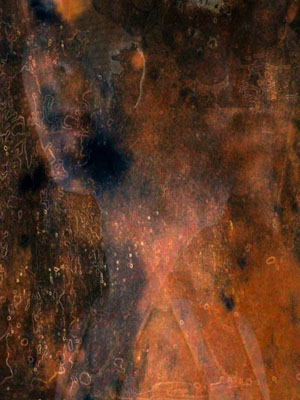Dakini of the DL

The face of the woman exchanges with a mask of itself, wrenched strangely on the same body and its pretty neck. As in some split brain optical textbook trick. There are water marks scribbled on a transparent surface, or else incised on space. You are in the parking lot tasting flakes of red rust and you cannot see her. Her face refuses to form. Look at her. Look at the face. The Dark Lord cannot see this woman. For him, his own face displaces her face. It looks like there is a world there. But standing outside of the abstract vestibule forbids that.
It looks enough like a world. Transluminal vapors smudge the recording surface, jiggled chromatically to make a pleasant enough pseudo-cosmographic poster, $29.95 at the planetarium. The Dakini is overwhelmed by the rumors of so grandiose a scale. But in the dusts and vapors attenuated and stretched across so many billions of parsecs, innumerable little faces form and deform just before the tricky pixels rise into view. It remains quite true that nobody knows why faces form. The attitude that wants to read the water marks, finds faces.
You look for the face of the woman and you find a beast face. There are priests that depart from the parking garage. They walk quietly, locked in concentration, as concentration takes over from the effort to assume concentration. Distraction is now not possible, but it amounts to the same thing. Intense elimination of the pertinent ambient. So that the image of the woman’s face cannot form properly. Face or mask wrenching the face from its gesture. Forcing it to face front.
That it cannot be stated who is the witness of or from the ambient, what the nature of the observation, measurement, or intervention is that forces the state vector to collapse, etcetera, only portends so much confusion between the physical and the ethical registries. You look away. The ambient regains its duplicities, the coherence by which it denies or underwrites the world. Impossible to characterize the witness. The necessity that there seem, a Dark Lord. But the DL himself recurs in the confusion he legislates. He cannot find the woman or form the circumstance of his own desire. Desire precedes him principially. It hoves to from the darkness of his nature, as the darkness of his nature is the conjugate doublet of the evanescence of the form of his desire. It tears the object from the glance that establishes it. And turns the page.